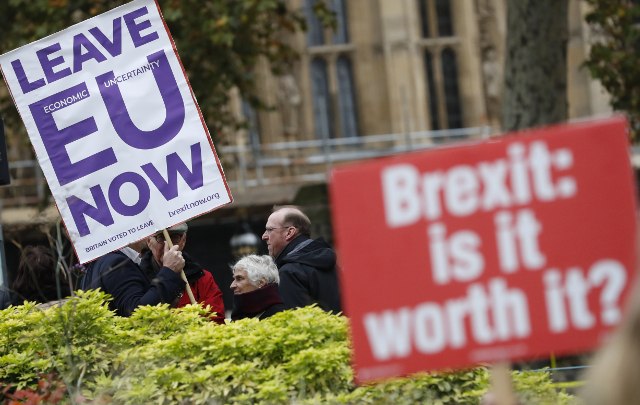Europe's door is still open to Britain
Monday, 19.11.2018.
12:24

Europe's door is still open to Britain
Essentially, there are just two. Europe's door is still open for Britain to stay if we vote to do so in second referendum, preferably before the European elections in late May. Otherwise, most of our fellow Europeans would rather we left on 29 March, leaving everything else to be sorted out later and allowing them to get on with confronting their own big challenges.Of course it's impossible to generalise about the views of some 450 million other Europeans, but among the leaders and official representatives of the 27 other member states, and the European institutions, there is a remarkable degree of consensus. They are fed up to the back teeth with how long the Brexit drama has taken and how unrealistic the British side has been. If you sit with Germans talking to French, or Poles talking to Italians, it's as if Brexit has already happened. Their mental time is spent on the Eurozone and Italy, Trump and trade, post-Merkel Germany, their own populists and the upcoming European elections. 'In Berlin, Brexit is about issue number 10,' one diplomat says. Even in areas where Britain used to be strong, such as foreign and security policy, the country has already experienced a catastrophic loss of influence, like a helicopter falling out of the sky.
One other thing on which they all agree is that they all agree. Despite British diplomatic attempts to divide and rule, the unity of the 27 has held and is constantly stressed. As a result, Ireland has effectively had a veto over the negotiation result – probably the first time in a long bilateral history that Ireland has been more powerful than Britain. This unity results from an unusual combination of strength and weakness. The EU's bargaining position is exceptionally strong, because Britannia has put a pistol to her own head and said 'give us a good deal or I will shoot myself'. Yet because of all those other crises, there is also a pervasive sense of weakness. This translates into a conviction, repeatedly made explicit by Angela Merkel, that Britain's position outside the EU must be seen to be worse than that of anyone inside, pour encourager les autres.
Behind this united front, there are different tendencies. A small minority positively want Britain to leave the EU, so that France, Germany and other core states can push ahead with making a federal Union. Martin Selmayr, the Metternich of the European Commission, is widely identified with this view.
Others say frankly that the English – and they know Britain well enough to mean specifically the English, rather than the Scots, Irish or Welsh – need to be taught a lesson. You English must have your noses rubbed in it, one former EU foreign minister told me, and discover how cold it is outside. Then, in ten years time, you will come back with your tails between your legs. A Dutch friend working for a European institution says the English must go through 'a valley of tears'. Well, thanks a lot, my friends.
Most of our fellow Europeans express various degrees of regret, but also want Britain to get on with it. This is Merkel's position, reinforced by a certain sororal solidarity with her fellow female leader and vicar's daughter, as May struggles to reach a compromise while angry men bray all around her.
At the other end of the spectrum is a significant minority, especially of north Europeans and people with close British connections, who are deeply distressed at the prospect of Britain's departure.
In terms of actual policy, however, these tendencies converge in a common position. Even if there is, strictly speaking, no such thing as 'no deal', the EU badly wants to avert an improvised, chaotic Brexit.
Merkel has led a chorus saying that the withdrawal agreement is not up for renegotiation. This is also intended to help May get it through parliament. In practice, insiders acknowledge that there could probably be a few tweaks, but nothing significant.
Gobsmackingly, the wording of the declaration on the future relationship has yet to be agreed. All we have at the moment is seven pages of draft bullet points, full of waffle, but crucially envisaging 'ambitious customs arrangements that build on the single customs territory provided for in the Withdrawal Agreement'. The current timetable foresees this declaration being agreed by Tuesday, with member states then having 48 hours to evaluate it. It beggars belief that the outline of the UK-EU relationship for decades to come is being handled like a last-minute student essay crisis.
While many in Westminster are still blithely talking of renegotiation, people in Brussels are generally adamant that the EU would not extend Article 50 just for more jaw-jaw. So the actual negotiation of a different future relationship would have to happen after Britain had left – and would therefore be in an even weaker negotiating position. Moreover, if Britain were to move much further in the direction of 'Norway' – not 'for now', which is a non-starter, but for good – that would require accepting freedom of movement.
For the growing army of Brits, in all parties and from all walks of life, who are now persuaded that the only good way forward is a second referendum, the crucial question is how the EU would react to a parliamentary vote to make that happen – once May's deal had been rejected in the 'meaningful vote', as it now seems almost certain to be.
On this variant, and only on this variant, the answers I have heard from the highest levels in the EU are entirely reassuring. Although one cannot absolutely guarantee in advance the attitude of every member state, the overwhelming consensus is that the EU would extend article 50 to allow time for any referendum in which one of the options would be to stay in the EU on the current terms. There's a legal and political difficulty around the European elections, for which a redistribution of the British MEPs' seats to other member states has already been decided on the assumption that Britain will leave on 29 March next year, but that, my interlocutors agree, must not stand in the way of a much larger, historic prize. Many express a concern that if Britain voted to stay in by a narrow majority – say 52:48 the other way – the UK would be an even more difficult, truculent partner, getting in the way of things that the rest of Europe needs to get on with. But that's a risk they will take, albeit often reluctantly.
So here's the good news: Europe's door is still open, if we decide in a people's vote to turn round and stay in. Otherwise, we can swallow the deal May has negotiated, and live unhappily ever after.


























































Komentari 2
Pogledaj komentare